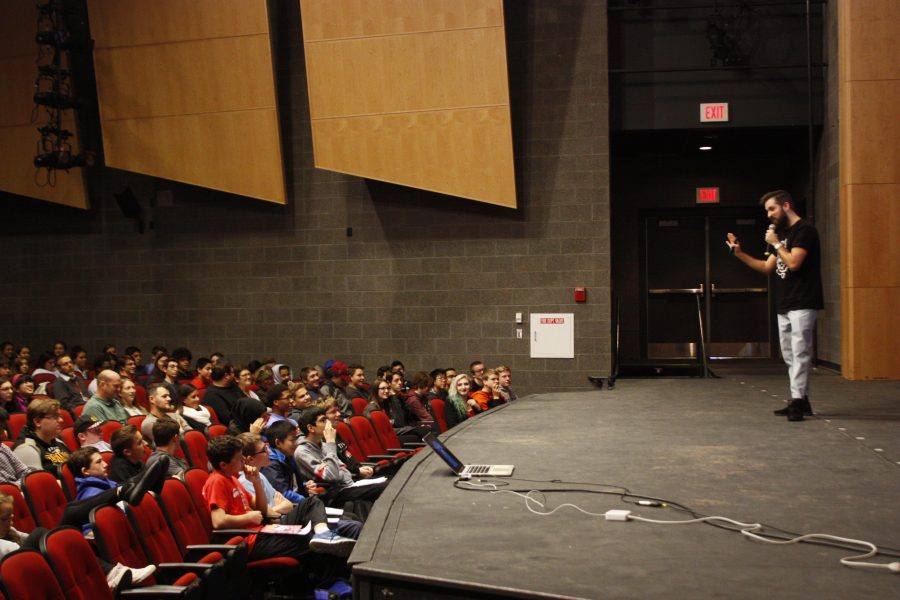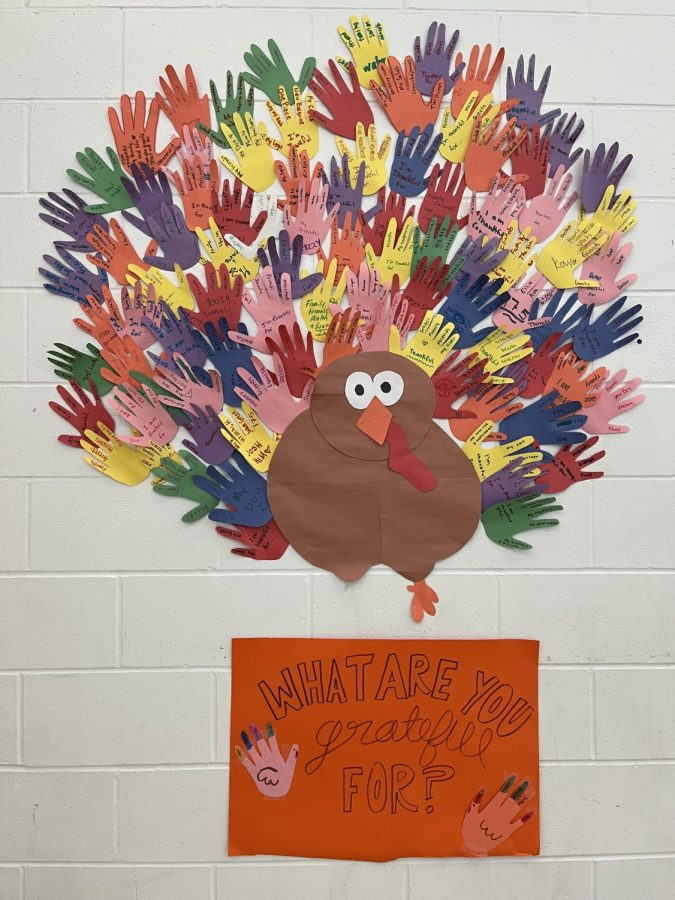[divider]A-block[/divider]
by Samantha Fredberg
Shuya Gong, a Harvard student and venture designer at IDEO, a global design company, provided insight to students about the successful ways to develop any idea into a business at Entrepreneurship Day A-block.
Gong began her presentation by asking the audience to draw the person sitting next to them in 30 seconds. “Many people in the audience say ‘I really don’t think you are this ugly,’ or ‘you don’t look like this, I’m just a bad drawer,” she said, “the point is, design needs urgency. We thought we needed more time to draw a picture of each other, but we managed to get it done in 30 seconds, and that’s all that matters.”
Gong explained that in order to create a successful business, product, or idea, one must look at what is desired or needed. “Silly Bands were nothing. It was just a rubber band, yet it was so desired that it blew up,” she said.
Society’s needs and desires are all around us, according to Gong. “If you go through airport security, you might see a big family of five with kids running around and screaming, and then a snooty business man who just has his carry-on and wants to get on the plane, and they’re going to hate each other. It is a problem that needed to be fixed,” she said.
“Someone saw this desire for there to be separate lines catered to separate people, and created TSA pre-check,” Gong explained.
Gong closed her presentation by encouraging students to accept failure and keep pursuing their ideas. “Just do something, make something, or test something, and see if it works,” she said.
[divider]E-block[/divider]
by Maya Waldman
Four college students from Babson College and UMASS discussed their experiences as young entrepreneurs today E-block in the auditorium.
Michael Kurson, Will Gunshenan, Charles Morris, and Max Perry all work as entrepreneurs, despite their young ages. Kurson, Gunshenan, and Morris work at their brewery business, Briggs Original, while Perry created a blanket company, Beantown Blankets.
Kurson spoke first, as the creator of Briggs Original. He described the importance of starting with research, and the advantages the current generation has, with the internet at their fingertips. His advice to young entrepreneurs was to identify a need in the community. “Take one step in the right direction,” he said. “Then the ball will start rolling.”
As an equity partner and head of sales at Briggs Original, Gunshenan also had ample advice to give to anyone who is inspired by an idea. “Find your passion, then apply yourself,” he said. Gunshenan added that when he reached out to successful entrepreneurs, he noticed that they wanted to share their knowledge, which he would not have received if he hadn’t applied himself.
“Everyone you meet has potential value to your company,” said Morris. “Starting out when you’re young can help you out with meeting those people.” He continued to describe the hardships and benefits that come with creating a business at such a young age. Kurson added that one advantage of being a young entrepreneur is that people are more receptive to working with you.
Perry created his blanket company, Beantown Blankets, with the organizational support of his mother. For every one blanket sale, Perry donates one blanket to a homeless person through a shelter. After helping over 400 homeless in the Boston area, Perry described the importance of finding a simple product, such as blankets, and adding social value to it. “When people see you’re helping others, others will help you,” he said. “They’ll reach out to you, and offer their help.”
[divider]G-block[/divider]
by Jackie Gong
Babson College associate professor G. Shankar delivered a talk about improving the world through social entrepreneurship as a part of Entrepreneurship Day, hosted by North’s Future Business Leaders of America club (FBLA) G-block in the auditorium last Friday.
“An entrepreneur is not someone who keeps planning, an entrepreneur is someone who acts, and learns by doing,” said Shankar.
Highlighting key traits in a “good entrepreneur,” Shankar cited passion as a more important factor than vision. “You can fake love, but you can’t fake passion,” he said.
Shankar also stressed the importance of perseverance when starting an entrepreneurial venture. “There are going to be a ton of failures. If you want to try something, try it quickly, so that you can fail quickly. Learn from your mistakes.”
Shankar explained social entrepreneurship as a concept where “you want to make a lot of money and improve society. You need to be able to start with the resources you have, and build by repeating. You might end up with a different goal than what you set out to do,” he said.
Citing a common theme at Babson, Shankar encouraged the audience to be “economically viable, environmentally sustainable, and socially responsible” in their endeavors to make the world a better place.
“Create value by being socially responsible, and empower small communities,” he said, and discussed various companies acting as models of social entrepreneurship, including MANA Nutrition, a company that sells small packets of enriched peanut butter to the United Nations to feed malnourished children around the world.
“Try to make the world a better place through your entrepreneurial ventures,” he concluded. “Make a difference.”
[divider]F-block[/divider]
by Maya Waldman
Inventor and CEO of Tranquilo Mat Melissa Gersin presented her journey of becoming an entrepreneur today F-block in the auditorium.
After working as a full-time maternity nurse at many medical institutions such as Mount Auburn Hospital, Brigham and Women’s Hospital, and Tufts Medical Center, Gersin noticed that many babies cried excessively despite their parents’ constant attention and care. Her solution was Tranquilo Mat, a portable mat that can help calm down infants.
Gersin studied the science behind why babies cry, and used her research to create an innovative product that was never seen on the market before. Gersin received inspiration from the research of doctor Harvey Carp, who believed that babies miss the womb for a few months after their birth.
Finally, Gersin came up with the idea of a mat that vibrates and hums softly, imitating a mother’s heartbeat. These noises and vibrations are similar to what a baby is expected to hear in the womb.
Like many entrepreneurs, Gersin first tested the product with her friends, spent a year trying to get the product licensed, and did a large amount of safety testing. “It’s really a moral dilemma,” she said. “The question is how I bring this product to market and make it safe.”
Despite all of the mistakes she made along the way, Gersin keeps optimistic, saying that they make success that much sweeter. “I’m always learning as I go along. If I can make a small difference, it means the world to me.”
To learn more about Tranquilo Mat, go to tranquilomat.com.
Entrepreneurship Day features business owners, investors, professors
November 22, 2016
0
Donate to The Newtonite
More to Discover














































